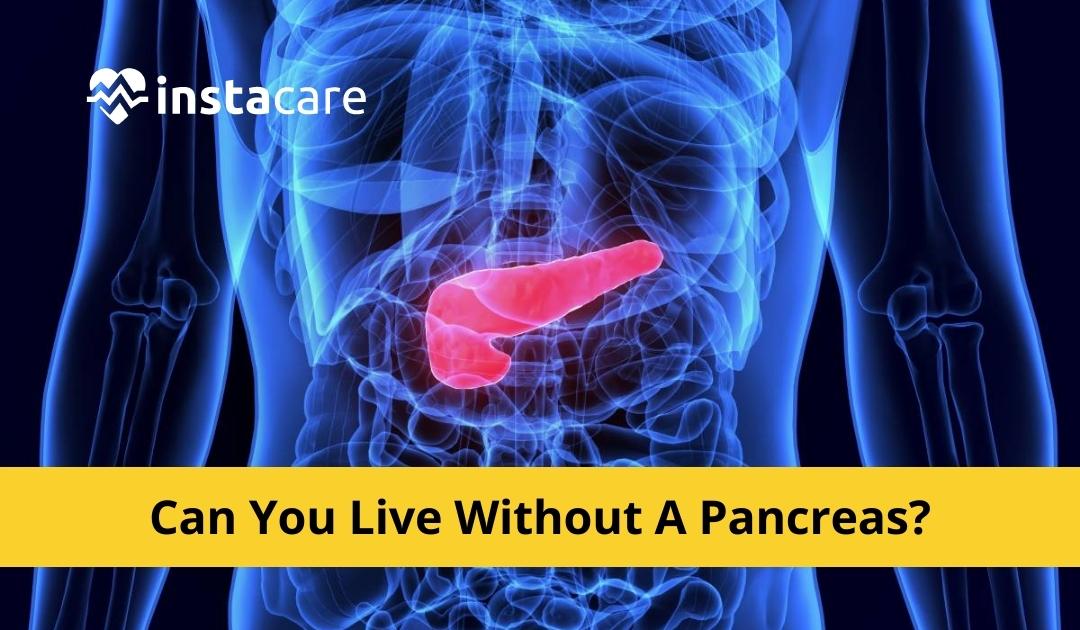Can you imagine life without a pancreas? For some individuals it's a reality due to chronic illnesses or injuries. With the organ responsible for secreting hormones and enzymes to digest food, living without this essential organ needs special considerations and treatments. While having no functioning pancreas may seem daunting, modern medicine has allowed people with pancreatic conditions to not only survive but thrive! We'll take an in-depth look at what it means to live without a pancreas and the different treatments available that make maintaining health possible.
What is the pancreas and what does it do in the body?
The pancreas is a vital organ located deep in the abdomen, behind the stomach and duodenum. It is an endocrine gland that produces hormones such as insulin, glucagon, and somatostatin. These hormones enable the body to regulate blood glucose levels by sending out signals that tell the body when to break down carbs, proteins and fat. Apart from its endocrine function, it also plays the role of an exocrine gland producing digestive enzymes to aid in breaking down food so it can be used by the body for energy.
Conditions that affect the pancreas
Can you live without a pancreas? This is an important question for those with pancreatic disease, as it may determine their treatment options. The pancreas is an organ located behind the stomach, responsible for helping with digestion and for creating hormones that regulate blood glucose levels. If it becomes severely damaged or diseased due to conditions such as chronic pancreatitis, pancreatic cancer, or diabetes mellitus, then patients may need to consider removing the organ. Though some people are able to function normally without a pancreas, others must rely on insulin injections and dietary treatments if they do not receive a transplant of a healthy pancreas. It is important to note that living without a functioning pancreas can make it difficult to absorb essential vitamins and minerals, meaning regular health check-ups are necessary in order to ensure overall wellness despite this condition.
Pancreas removal surgery and recovery
Can you live without a pancreas? The answer is yes. Pancreas removal surgery, in medical terms known as pancreatectomy, is an option for those diagnosed with severe pancreatic diseases such as pancreatic cancer, chronic pancreatitis, and cystic fibrosis. During this procedure the entire organ, including its head, neck, body and tail are surgically removed from the body. After the surgery it takes some time to properly recover and some people may require one or more additional surgeries to fully restore their normal functioning of the digestive system.
View More: 10 Foods To Avoid With Diverticulitis
Patients will be placed on hormone replacement therapy so that digestive enzymes can still function normally even though the pancreas has been removed. A specialized diet for digestion is also recommended by doctors and nutritionists during recovery period post-surgery. Good lifestyle habits like not smoking and exercising regularly will promote quicker recovery after surgery.
Why would the pancreas be removed?
The pancreas can be removed for a variety of medical reasons. The most common reason is the advanced stages of pancreatic cancer, where the removal of the organ is seen as a strategic measure to keep its effects from spreading further or recurring. In less extreme cases, partial removal may be done for benign tumors that are located within the pancreas.
Sometimes, conditions such as chronic pancreatitis also require an operation known as a "pancreaticoduodenectomy", wherein parts of the pancreas, duodenum and surrounding lymph nodes must be removed in order to effectively treat this condition and alleviate the patient's pain. All of these operations come with serious considerations and robust pre-operation counseling concerning long term impact that must occur before surgery can proceed.
Pancreas Diseases
Can you live without a pancreas? Fortunately, the answer is yes. If the organ needs to be removed due to severe pancreatic diseases such as cancer or diabetes, people can still survive with close monitoring and an altered diet. Several metabolic and digestive functions are performed by the pancreas, so removing it can cause serious consequences. Often times, a person will need lifelong treatment for replacement hormones and insulin. Depending on the type of disease, transplants may be an option. The most common diseases related to pancreas include pancreatitis, cystic fibrosis, pancreatic cancer, insulin resistance, and type 1 diabetes. It is important to talk to your doctor if you have any symptoms that may indicate any of these diseases in order to get a proper diagnosis and treatment plan.
Pancreas Diseases Causes
One of the most common causes of pancreatic diseases is obesity, as it can increase your risk of developing type 2 diabetes, a disorder that affects how your body metabolizes sugar. Other contributing factors include smoking, drinking too much alcohol, eating an unhealthy diet that is high in processed foods and lacking in fruits and vegetables, having certain viral infections such as hepatitis C or HIV, and genetics. Additionally, certain medications like steroids or chemotherapy drugs can also increase your risk for pancreatic diseases. While there are some steps you can take to reduce your risk for developing a disease of the pancreas - such as adopting a healthier lifestyle - ultimately it's important to monitor any symptoms you experience with the help of a doctor.
Pancreas Diseases Symptoms
Pancreas diseases tend to show different symptoms, depending on the type and severity of the issue. Common symptoms may include abdominal pain that radiates to your back, nausea, diarrhea, loss of appetite, weight loss, fatigue and yellowing of the skin and eyes (jaundice). In some rare cases, patients may also experience hypoglycemia (low blood sugar levels) due to improper regulation of insulin released from the pancreas. Therefore if you are experiencing any of these symptoms for more than a few days then it is best to seek medical advice immediately as early diagnosis reduces the risk of complications.
Pancreas Diseases Treatment
Treating pancreatic diseases can be hugely complex and challenging, as the pancreas is so integral for the regulation of different functions in the body. Some treatments depend on the type of pancreatic disease one has, such as surgery, medication or lifestyle changes to potential alleviate symptoms. Patients may also speak with their doctor about anti-nausea medications to help ensure they are receiving enough nutrition, steroids to reduce inflammation and diabetes drugs in order to manage insulin levels. The focus of treatment typically revolves around maintaining proper nutrition and targeting underlying conditions that are linked to the patient’s pancreatic disease. Additionally, participating in a clinical sleep study could also be beneficial for patients suffering from this condition.
Living without a pancreas - how to cope with the condition
Can You Live Without A Pancreas? Yes, it is possible to live without a pancreas. This condition is also known as pancreatectomy and can happen due to an injury or disease. While it is a serious medical concern, there are many treatments available that can help individuals manage the symptoms of not having a pancreas.
Depending on the individual’s condition, these may include lifestyle changes such as monitoring carbohydrate intake, taking insulin injections regularly and maintaining regular blood sugar tests. Additionally, medications that replace digestive enzymes are necessary to reduce digestive problems caused by the lack of the pancreas. Keeping in close contact with your doctor and following their instructions is key in successfully managing this condition.
View More: 10 Natural Blood Thinners for Heart Health
Pancreas transplants - risks and benefits
Pancreas transplants can provide many benefits to people who suffer from chronic diseases like Type 1 and Type 2 diabetes. Pancreas transplantation helps regulate blood sugar levels, normalize metabolism and reduce the patient's total dependency on insulin for survival. The transplant may also slow down the progression of kidney failure, enable better control over blood pressure, and help stabilize blood cholesterol levels. However, it is important to remember that as with any major medical procedure, there are risks associated with a pancreas transplant. These include infection, organ rejection, bleeding and other possible complications from the surgery itself. Additionally, while a successful transplant offers many long-term health benefits, short-term side effects such as fatigue can occur. For these reasons, those considering a pancreas transplant should discuss all potential risks and benefits with their healthcare provider beforehand in order to make informed decisions about this life-saving treatment option.
Resources for more information on pancreatic diseases and transplants
Staying informed about pancreatic diseases and transplants is key for getting the best medical care. Thankfully, there are plenty of resources available online that make it easy to learn about these conditions. Resources like Medline Plus offer detailed information on diagnosis and treatment used for various pancreatic diseases. Many patient advocacy groups can be found online, offering further advice and support to those affected by pancreatic conditions. With access to quality information regarding pancreatic diseases now easier than ever before, patients should take advantage of all the resources made available to them when it comes to this life-altering decision.
Conclusion
To sum up, living without a pancreas is not only possible, but for people with chronic pancreatitis, it is often necessary to help them manage more serious health conditions. With modern medical advances and better nutrition plans today, life without a pancreas can be manageable if you have the right support and care. Those who undergo a full or partial pancreatectomy had reported improvements in their quality of life despite long-term lifestyle changes that need to be made. Living with chronic pancreatitis or no pancreas is by no means easy, however learning how to incorporate the right daily habits and having an understanding and dedicated team of healthcare providers can make the transition easier.
Finally, if you or anyone you know has been diagnosed with pancreatic problems such as chronic pancreatitis or even necrotizing pancreatitis, please don’t hesitate to seek out medical advice and discuss the best options available for your own needs. Doing so can give you greater control over your own health while still giving you access to any treatments needed should anything happen.
Please book an appointment with the best Nutritionist in Lahore, Karachi, Islamabad, and all major cities of Pakistan through InstaCare, or call our helpline at 03171777509 to find a verified doctor for your disease.
Source: https://instacare.pk/blog/can-you-live-without-a-pancreas








